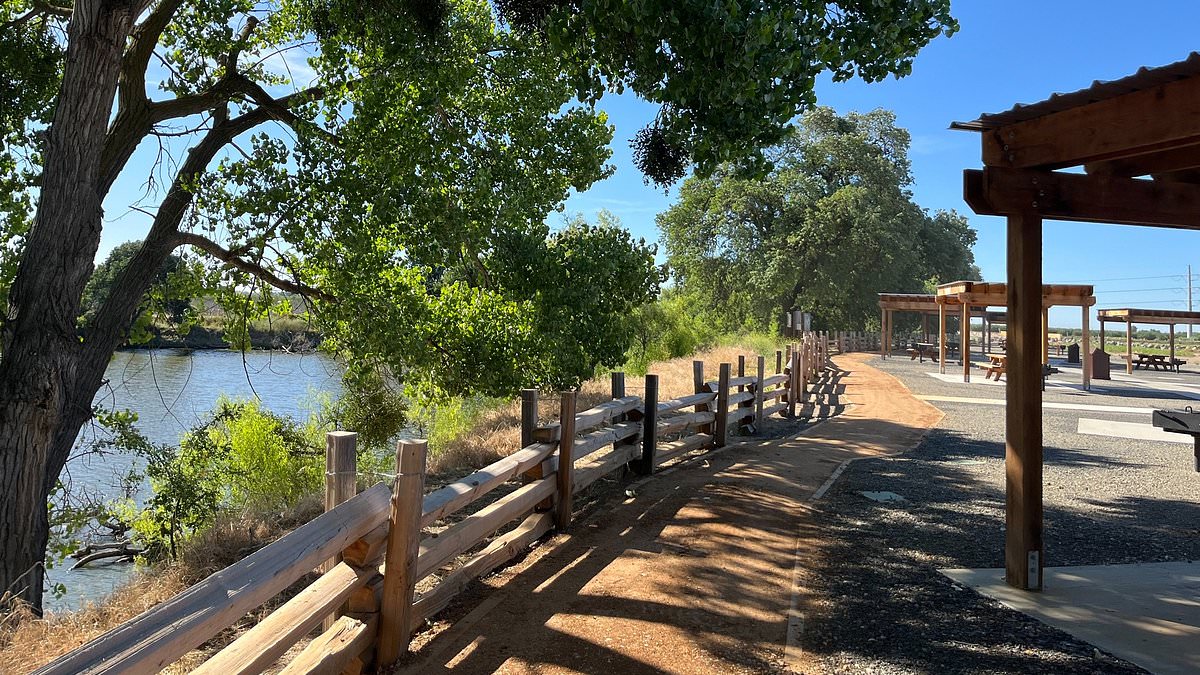The future of a tiny California town has been secured thanks to the opening of a brand new State Park which opened earlier this week.
Dos Rios State Park in the Central Valley is a floodplain restoration initiative that has seen farmland returned to its natural state.
The park sits less than 5 miles from Grayson, a small farming community of just 1,600, which is slowly springing back to life.
The mostly Latino town is so poor that kids used to play soccer in the graveyard, until a community center was built in 2005.
But now, the restoration efforts in transforming the dairy farmland back to the wild have already proven effective in protecting Grayson from flooding – and it’s likely that more visitors will be drawn to the area as the beautiful wildlife returns.
The project, which started in 2002 means Dos Rios State Park is the first state park to open in ten years, making it California’s 281st.
Some 13 federal, state, and local agencies have been involved in the $40 million transformation.
‘This is a place to experience the world at home,’ California State Parks Director Armando Quintero said during Wednesday’s opening ceremony.
The 1,600-acre parcel of land in the San Joaquin Valley, is situated in the floodplains near Modesto, is where the San Joaquin and Tuolumne rivers meet.
Many believe the restoration of the farmland to its natural floodplain saved the community of Grayson from being destroyed when flooding hit the area in 2023.
Advocates for floodplain restoration say it can help solve California’s dual dangers of flooding and drought, replenishing groundwater for future drought relief while protecting towns from the catastrophic flooding that scientists predict will come with climate change.
‘It performed exactly as planned,’ said Julie Rentner, president of the non-profit organization River Partners, which bought the land off private owners and has revived much of the natural landscape, enabling floodwaters that had once been confined by levees to meander across the plain, recharging the aquifer below.
‘It was really scary, man, the river coming up all that time. But all that work we’ve done, planting out back here, I think it did help with the water,’ David Guzman, who lives along the San Joaquin River, said.
It is impossible to determine for certain that the floodplain saved Grayson. Years of drought had also drained the river of its fury. But some experts say floodplain restoration can help spare adjacent towns.
In 2010, the San Francisco Public Utilities Commission contributed $2 million towards the park’s acquisition, recognizing that the the land would also help protect water quality for San Francisco.
In the past, there was no way to access the land but now the park has become a haven for locals.
‘A lot of my residents don’t have the opportunity to leave the area. Everybody I talk to — and I talk to everybody — wants to know how they can enjoy coming out here,’ Lilia Lomeli-Gil told SFGate. ‘I tell them it’s in the infancy stage.’
The park is also vital for wildlife, especially during winter months when millions of geese, ducks, and cranes migrate along the Pacific Flyway – a major north-south route for migratory birds in the Americas, extending from Alaska to Patagonia.
Currently, Dos Rios is open to visitors only on weekends with a reservation but there are plans to introduce a host of wildlife activities including swimming, fishing and boating, together with trails for biking and bird watching.
There may even be several campgrounds developed on the land, possibly replacing an almond orchard – a place for people to reconnect with nature.
Visitors can still explore the almond orchards up close, while a new welcome center offers a picnic area under wooden shelters built from trees salvaged from a 2020 wildfire.
Tours of the park are also available under the guide of a State Parks rep.
The park is lined with white seed hairs from eastern cottonwood trees, providing visitors a serene escape.
‘There could be more services, but we live out here in the middle of these orchards,’ said John Mataka, 73, a retired drug and alcohol counselor and one of the restoration volunteers.
He said those who donated their labor and time to the project that day ‘were laughing and having a good time. It brought a sense of importance to the community.’
